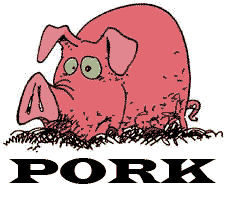 A proposed amendment to the bloated $1 trillion federal farm pork bill should be of concern to both states’ rights and humane farming advocates. The Protect Interstate Commerce Act, introduced by Rep. Steve King (R-Iowa), would amend the already bloated corporate farm subsidy bill by limiting states’ power to supervise their own farming standards, over-turn existing state laws, and prevent states from enacting stricter standards than what other states have enact.
A proposed amendment to the bloated $1 trillion federal farm pork bill should be of concern to both states’ rights and humane farming advocates. The Protect Interstate Commerce Act, introduced by Rep. Steve King (R-Iowa), would amend the already bloated corporate farm subsidy bill by limiting states’ power to supervise their own farming standards, over-turn existing state laws, and prevent states from enacting stricter standards than what other states have enact.
According to the San Francisco Chronicle, Senators Dianne Feinstein and Barbara Boxer, along with several House Republicans say that King’s amendment would also override state laws regulating farming, 12 state restrictions on firewood enacted to fight invasive pests and five state laws mandating labels for farm-raised catfish.
James Stewart at the NY Times, called the farm subsidy bill a “widely ridiculed handouts to wealthy farmers and perverse incentives that have long united liberals concerned about the environment, conservatives upset about the deficit and market-distorting subsidies, and just about everyone concerned about basic fairness except the powerful farm lobby and its allies in Congress, which every five years or so since the Depression has managed to fight off any meaningful reforms and actually increase farm subsidies.”
While the farm bill is in dire need of reform, both the House and Senate agricultural committees are still offering classic bait-and-switch proposals to protect farm subsidies – more than 80% of which goes to households much wealthier than the average American family, according to Vincent Smith, professor of Economics at Montana State University.
CBO estimated back in June that new farm subsidy programs will cost about $3.5 billion a year. In fact, several independent studies have shown that if crop prices drop, even quite modestly, American taxpayers will be shelling out far more for these new programs than the $5 billion in claimed savings for the elimination of the Direct Payments program. If crop prices shift towards longer-run historical levels, taxpayers could face an estimated $16 to $20 billion in new farm subsidy costs. That’s a lot of money, and most of it would go to the wealthiest farmers, corporations and landowners in the farm sector.
The federal government paid $11.3 million in taxpayer-funded farm subsidies from 1995 to 2012 to 50 billionaires or businesses who have some form of ownership in corporate farms according to a report released Thursday by the Environmental Working Group, a Washington-based research organization. Billionaires with a collective net worth of $316 billion, who received subsidies or owned companies that received subsidies include Microsoft cofounder Paul Allen; investment tital Charles Schwab; and S. Truett Cathy, owner of Chick-fil-A; Charles Ergin of DISH; Jim Kennedy of Cox Enterprises, and David Rockefeller, Sr.
The Working Group said its findings were likely to underestimate the total farm subsidies that went to the billionaires on the Forbes 400 list because many of them also received crop insurance subsidies and Federal law prohibits the disclosure of the names.
Perhaps we underestimated Obama’s redistribution plan. Most assume redistribution of wealth means taking money from the wealthiest among us and giving it to the poorest. I am beginning to think that redistribution means taking it from the bottom and passing it up the chain.

